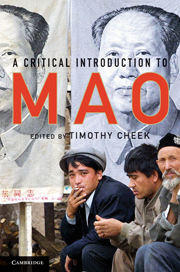Book contents
- Frontmatter
- Contents
- List of Illustrations
- About the Contributors
- Preface
- Acknowledgments
- Timeline of Twentieth-Century China
- Maps
- Part I Mao's World
- Part II Mao's Legacy
- 10 For Truly Great Men, Look to This Age Alone: Was Mao Zedong a New Emperor?
- 11 Recent Mao Zedong Scholarship in China
- 12 Third World Maoism
- 13 Mao's Journeys to the West: Meanings Made of Mao
- 14 Two Perspectives on Mao Zedong
- Appendix: Selected Further Readings (Annotated)
- Index
- References
10 - For Truly Great Men, Look to This Age Alone: Was Mao Zedong a New Emperor?
Published online by Cambridge University Press: 05 August 2012
- Frontmatter
- Contents
- List of Illustrations
- About the Contributors
- Preface
- Acknowledgments
- Timeline of Twentieth-Century China
- Maps
- Part I Mao's World
- Part II Mao's Legacy
- 10 For Truly Great Men, Look to This Age Alone: Was Mao Zedong a New Emperor?
- 11 Recent Mao Zedong Scholarship in China
- 12 Third World Maoism
- 13 Mao's Journeys to the West: Meanings Made of Mao
- 14 Two Perspectives on Mao Zedong
- Appendix: Selected Further Readings (Annotated)
- Index
- References
Summary
In 1980, the political scientist Yan Jiaqi offered a critique of what he called the “disguised monarchism” of twentieth-century China. He was writing during a unique period of reevaluation following the death of Mao Zedong in September 1976 and the formal end of the Cultural Revolution era (1964–78).
What Yan meant by “disguised monarchism” was the persistence in twentieth-century China of a politics that saw “the concentration of supreme power in the hands of one person and his secretive courtiers, for life.” Yan argued that despite the notional end of two millennia of dynastic rule when the last emperor abdicated the throne in 1911, monarchism survived as a style of rule. In practice, it included such features as “the deification of the ruler; the periodic slaughter of meritorious ministers below the ruler, whose jealousy of such ministers was preordained; incessant struggles among court factions; and the occasional usurpations of power by eunuchs or by the ruler's relatives, including relatives of his mother or wives.” For Yan, among many others in the late 1970s and early 1980s, these were all characteristics of Mao Zedong's last two decades in power.
- Type
- Chapter
- Information
- A Critical Introduction to Mao , pp. 243 - 272Publisher: Cambridge University PressPrint publication year: 2010
References
- 5
- Cited by



